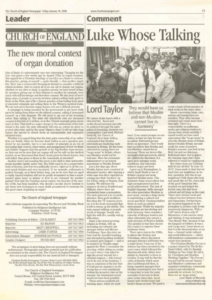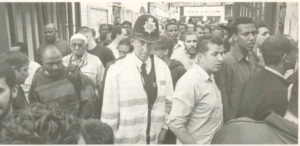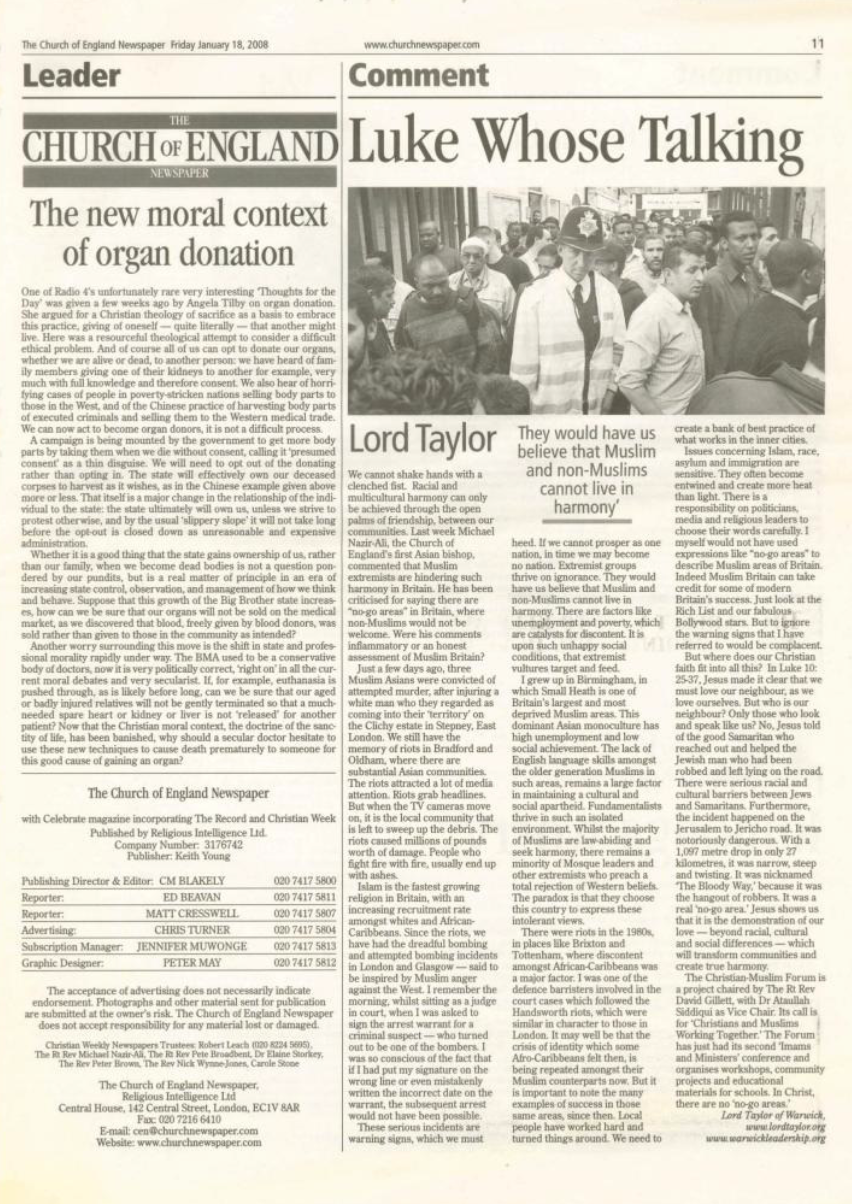Church of England Article By Lord Taylor of Warwick
 We cannot shake hands with a clenched list. Racial and multicultural harmony can only be achieved through the open palms of friendship, between our communities. Last week Michael Nazir-Ali, the Church of England‘s first Asian bishop, commented that Muslim extremists are hindering such harmony in Britain. He has been criticised for saying there are “no-go areas” in Britain, where non-Muslims would not be welcome. Were his comments inflammatory or an honest assessment of Muslim Britain?
We cannot shake hands with a clenched list. Racial and multicultural harmony can only be achieved through the open palms of friendship, between our communities. Last week Michael Nazir-Ali, the Church of England‘s first Asian bishop, commented that Muslim extremists are hindering such harmony in Britain. He has been criticised for saying there are “no-go areas” in Britain, where non-Muslims would not be welcome. Were his comments inflammatory or an honest assessment of Muslim Britain?
Just a few days ago, three Muslim Asians were convicted of attempted murder, after injuring a white man who they regarded as coming into their ‘territory’ on the Clichy estate in Stepney, East London. We still have the memory of riots in Bradford and Oldham, where there are substantial Asian communities. The riots attracted a lot of media attention. Riots grab headlines. But when the TV cameras move on, it is the local community that is left to sweep up the debris. The riots caused millions of pounds worth of damage. People who fight fire with fire, usually end up with ashes.
Islam is the fastest growing religion in Britain, with an increasing recruitment rate amongst whites and African-Caribbeans. Since the riots, we have had the dreadful bombing and attempted bombing incidents in London and Glasgow – said to be inspired by Muslim anger against the West. I remember the morning, whilst sitting as a judge in court, when I was asked to sign the arrest warrant for a criminal suspect – who turned out to be one of the bombers. I was so conscious of the fact that if I had put my signature on the wrong line or even mistakenly written the incorrect date on the warrant, the subsequent arrest would not have been possible.
These serious incidents are warning signs, which we must heed. If we cannot prosper as one nation, in time we may become no nation. Extremist groups thrive on ignorance. They would have us believe that Muslim and non-Muslims cannot live in harmony. There are factors like unemployment and poverty, which are catalysts for discontent. It is upon such unhappy social conditions, that extremist vultures target and feed.
I grew up in Birmingham, in which Small Heath is one of Britain’s largest and most deprived Muslim areas. This dominant Asian monoculture has high unemployment and low social achievement. The lack of English language skills amongst the older generation Muslims in such areas, remains a large factor in maintaining a cultural and social apartheid. Fundamentalists thrive in such an isolated environment. Whilst the majority of Muslims are law-abiding and seek harmony, there remains a minority of Mosque leaders and other extremists who preach a total rejection of Western beliefs. The paradox is that they choose this country to express these intolerant views.
There were riots in the 1980s, in places like Brixton and Tottenham, where discontent amongst African-Caribbeans was a major factor. I was one of the defence barristers involved in the court cases which followed the Handsworth riots, which were similar in character to those in London. It may well be that the crisis of identity which some Afro-Caribbeans felt then, is being repeated amongst their Muslim counterparts now. But it is important to note the many examples of success in those same areas, since then. Local people have worked hard and turned things around. We need to create a bank of best practice of what works in the inner cities.
Issues concerning Islam, race, asylum and immigration are sensitive. They often become entwined and create more heat than light. There is a responsibility on politicians, media and religious leaders to choose their words carefully. I myself would not have used expressions like “no-go areas” to describe Muslim areas of Britain. Indeed, Muslim Britain can take credit for some of modern Britain’s success. Just look at the Rich List and our fabulous Bollywood stars. But to ignore the warning signs that I have referred to would be complacent.
But where does our Christian faith fit it into all this? In Luke 10: 25-37, Jesus made it clear that we must love our neighbour, as we love ourselves. But who is our neighbour? Only those who look and speak like us? No, Jesus told of the good Samaritan who reached out and helped the Jewish man who had been robbed and left lying on the road. There were serious racial and cultural barriers between Jews and Samaritans. Furthermore, the incident happened on the Jerusalem to Jericho road. It was notoriously dangerous. With a 1,097 metre drop in only 27 kilometres, it was narrow, steep and twisting. It was nicknamed ‘The Bloody Way,’ because it was the hangout of robbers. It was a real ‘no-go area.” Jesus shows us that it is the demonstration of our love – beyond racial, cultural and social differences – which will transform communities and create true harmony.
 The Christian-Muslim Forum is a project chaired by the Rt Rev David Gillett, with Dr Ataullah Siddiqui as Vice chair. Its call is for ‘Christians and Muslims Working Together.’ The Forum has just had its second ‘Imams and Ministers’ conference and organises workshops, community projects and educational materials for schools. In Christ, there are no ‘no-go areas.’
The Christian-Muslim Forum is a project chaired by the Rt Rev David Gillett, with Dr Ataullah Siddiqui as Vice chair. Its call is for ‘Christians and Muslims Working Together.’ The Forum has just had its second ‘Imams and Ministers’ conference and organises workshops, community projects and educational materials for schools. In Christ, there are no ‘no-go areas.’
